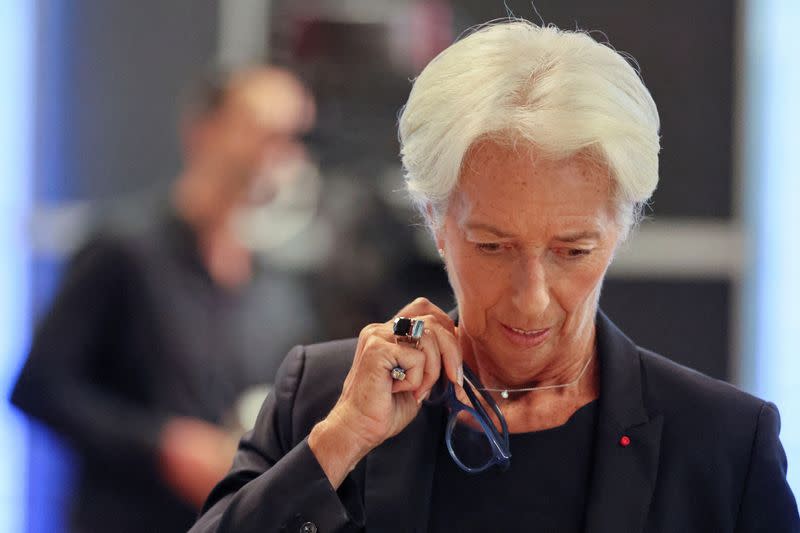Go big or even bigger?: Five questions for the ECB
By Dhara Ranasinghe, Stefano Rebaudo and Vincent Flasseur
LONDON (Reuters) -European Central Bank policymakers meeting on Thursday have a choice between a big 50 basis point interest rate hike, or an even bigger one to contain record high inflation.
Investors have priced in a greater chance of a supersized 75 basis point move since last week's 9.1% record-high inflation figure and pressure is on the ECB to go hard now before economic conditions deteriorate and its room to tighten shrinks.
"It still feels like the ECB is playing catch up and that makes it more likely that they will hike by 75 (bps) and remain hawkish," said Mike Riddell, senior fixed income portfolio manager at Allianz Global Investors.
A new surge in gas prices and a fall in the euro on Monday following Russia's latest gas pipeline shut to Europe could cement the case for a more aggressive move.
Here are five key questions for markets.
1/ Does the size of the rate hike matter?
A bigger move would show a determination to curb inflation running way above the ECB's 2% target and help bolster the bank's credibility. The ECB opted for a bigger-than-expected July move and other big central banks have hiked aggressively.
A 50 bps move is expected on Thursday but markets have ramped up bets on a bigger 75 bps hike and some banks, such as Goldman Sachs predict one.
Some ECB policymakers want a debate on the bigger hike but others, such as Francois Villeroy de Galhau, say the next rate move should be "orderly and predictable."
"The ECB, which is currently behind the curve, will have to tighten its monetary policy aggressively at least until the beginning of 2023, when we can see a peak in the rise of consumer prices," said Flavio Carpenzano, fixed income investment director at Capital Group.
2/ How quickly will inflation come down?
The latest ECB economic forecasts on Thursday will likely predict inflation remaining higher for longer.
Policymakers and analysts have pushed back expectations for when inflation will peak and soaring gas prices complicate the outlook.
Thursday's meeting takes place days after Russia kept one of its main gas supply routes to Europe shut, stoking fears that soaring gas prices will keep inflation high.
Given this backdrop, ECB chief Christine Lagarde may be reluctant to be drawn on when inflation could peak.
Berenberg expects euro area inflation to top 10% in the fourth quarter before edging lower in early 2023.
3/ Does the energy shock make a recession inevitable?
Economists reckon that is increasingly the case, especially as a winter with looming energy shortages approaches and forward-looking indicators paint a gloomy picture.
Gas prices have risen further since the ECB last met and jumped 30% at Monday's open .
The ECB's Villeroy believes a European recession is unlikely, but that nothing could be ruled out for next year. A recession in Germany, the euro zone's biggest economy, is increasingly likely, the Bundesbank said last month.
"The quicker they tighten this year, the sooner they will probably pause rate hikes," said Fidelity International portfolio manager Ario Emami Nejad.
4/ How does the weak euro weigh into the policy outlook?
A weak currency, which makes imports more expensive, bolsters the case for more aggressive rate hikes. The euro fell below 99 cents for the first time in nearly two decades on Monday and is down almost 13% this year. Measured against a basket of currencies weighted in terms of trade, the euro has fallen almost 3% from June levels.
The ECB's July meeting minutes showed concern about currency weakness.
"The ECB has always said it's not level of the euro but the pace of the move that matters," said Pictet Wealth Management's head of macroeconomic research Frederik Ducrozet. "But there's also the move below $1 and you don't want another 5-10% move in the currency."
5/ How soon could the ECB end bond reinvestments?
The ECB is unlikely to debate ending reinvestments from the maturing bonds it holds through its 3.3 trillion euro ($3.3 trillion) Asset Purchase Programme.
But the question could come up at the news conference.
The Federal Reserve has started reducing its balance sheet and doing this would be the next step in normalising ECB policy.
For now, rate hikes will come first, recent comments from Dutch central bank chief Klaas Knot and others suggest.
(Reporting by Dhara Ranasinghe in London and Stefano Rebaudo in Milan; graphics by Vincent Flasseur, Editing by Tommy Reggiori Wilkes, Tomasz Janowski and Ed Osmond)

 Yahoo Finance
Yahoo Finance 

